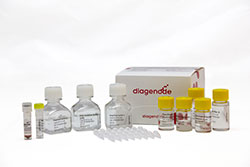Cells store information by means of chromatin modifications that persist through cell divisions and can hold gene expression silenced over generations. However, how these modifications may maintain other gene expression states has remained unclear. This study shows that chromatin modifications can maintain a wide range of gene expression levels over time, thus uncovering analog epigenetic memory. By engineering a genomic reporter and epigenetic effectors, we tracked the gene expression dynamics following targeted perturbations to the chromatin state. We found that distinct grades of DNA methylation led to corresponding, persistent gene expression levels. Altering the DNA methylation grade, in turn, resulted in permanent loss of gene expression memory. Consistent with experiments, our chromatin modification model indicates that analog memory arises when the positive feedback between DNA methylation and repressive histone modifications is lacking. This discovery will lead to a deeper understanding of epigenetic memory and to new tools for synthetic biology.


